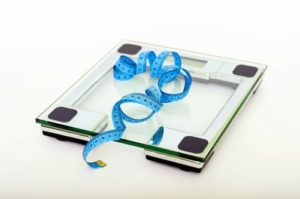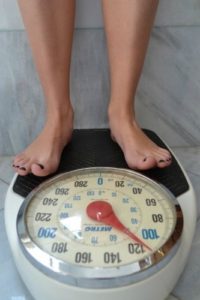Dieting and the Dragon of Perfectionism-Confession of a Couch Slug
 In my last installment of Confessions of a Couch Slug, I related my story of getting obsessed with dieting and calorie counting and how it eventually led me to give up my pursuit of a strong, healthy body.
In my last installment of Confessions of a Couch Slug, I related my story of getting obsessed with dieting and calorie counting and how it eventually led me to give up my pursuit of a strong, healthy body.
Hitting Bottom
I realized that I had hit the bottom when I was looking up the calorie count for a communion wafer and realized how my relationship with food had become too unhappy to bear. I returned to the safe embrace of the couch and put on most of the weight I had worked so hard to lose.
I’m going to be very honest here - I scared the ever-loving crap out of myself in that awful moment. I had placed myself on a strict 1200 calorie per day diet. Without the energy to even complete my workouts, I was unable to increase weights/reps/etc. I was shaky, weak and lightheaded most of the time. It was difficult to concentrate while I was teaching classes and in rehearsals. My reflexes were off and my driving was compromised. I was irritable and tired, and probably not much fun to be with. Many of my conversations with colleagues and friends centered on food and calories. It took me forever to order food at a restaurant, as I looked up calories online and tracked my food as I ate. All of this was due to my dieting.
It’s totally OK if you hate me as you are reading this description. I came to hate myself for acting this way, but I couldn’t stop. It’s only in hindsight that I understand more about what was driving my obsession with dieting during this difficult period of my life.
Old Patterns
I grew up the eldest of two children. My younger brother was athletic - a swimmer and a cross-country runner. I was a band geek. Sports didn’t interest me, and by the time I got to high school, the only time I spent exercising was on my bicycle, visiting friends (since I didn’t drive). I was a very good student and spent most of my school years in accelerated academic programs. Between schoolwork and practicing a musical instrument, I really didn’t have time for sports (or much else, for that matter).
At some point in high school, my mother described to me her “finishing complex”. She told me that once she started something - a project, a cleaning chore, a plate of cookies - she felt compelled to finish it. At the time, I thought that this was a very silly concept, and I probably scoffed at it openly.
But during my undergraduate, I adopted the very same attitude toward projects, studying, even dreaded cleaning chores (once I got started). I rationalized that this was a POSITIVE manifestation of my mother’s “finishing complex”, and that only good things would come of such drive and determination. What I didn’t realize then was that I was firmly in the grips of what would become my nemesis: perfectionism.
The Dragon Awakes

The Dragon of Perfectionism
Perfectionism is a subtle curse that plagues its sufferers in insidious ways. I viewed finished things as having the potential to be perfect, and that was the highest point of praise. As I entered graduate school, the academic bar was raised higher and my perfectionism rose to meet and exceed that goal. There was no such thing as “good enough” in my world. I worked myself ragged to earn a place alongside the top students in my program.
There was little room for recreation or play - certainly, there was no room for voluntarily “letting something go.” When I lost the contents of a zip drive to a virus in the computer lab and consequently lost the music history paper that was due in two days that I had been working on for months, I vomited repeatedly in the bathroom as I worked up the nerve to call my professor.
I went from being a messy teenager to being obsessively neat about my workspace. I felt close to crazy as I ramped up into a full-blown type-A personality, complete with compulsions.
Some drastic events conspired shortly after I graduated from the doctoral program to send me into a complete nervous breakdown. My recovery included taking a hard look at this perfectionistic behavior. I had to learn to allow myself the slack required to be a functional human being. Learning how to say “screw it” to the small things was an important lesson. Unrealistic standards were no longer allowed to rule my life. I felt more relaxed and more productive.
And then I started dieting and counting calories.
It's a Good Thing, Right?
At first, it was an intellectual exercise - monitoring and logging the food I was eating. I learned about portion sizes and how to read nutritional labels. As a result, I felt empowered as I developed an understanding of what I was putting into my body. I also counted negative calories, taking credit for exercise performed. The balance sheet counted my calories in and calories out. I regularly ran a negative balance and lost weight quickly at the beginning. But when I stepped up my training to include a more rigorous program of weightlifting and cardio, all of the positive feedback I had received from my initial weight loss success awakened my inner perfectionistic dragon. Everything I did was geared toward maximum results (weight loss), so I ate less, worked out more, and expectantly stepped onto the scales each morning.
My weight loss slowed, and then completely plateaued. I was never going to reach my goal, and I would never have the feeling of being "finished." I figured that stricter dieting had to be the answer. So, I ate less, thinking that the scales of the equation (calories in/calories out) needed to be tipped a little more sharply. I ate under 1000 calories per day at this point, and I felt like crap.
Calories are complicated
I was laboring under the belief that the calories in/calories out equation was a matter of simple math. I was incredibly wrong. I am no dietician or nutritionist, but I’ve learned a few things that wildly contradict my earlier beliefs:
- Your workout requires recently ingested calories to maintain strength/endurance/intensity.
- If you have no food in your stomach, your body will literally eat its own muscle to sustain your workout.
- You cannot sustain any program of exercise under muscle breakdown conditions.
- If you do not eat a certain number of calories per day, your body will go into a fat-hoarding starvation mode.
- If you do not eat regularly throughout the day, this starvation mode may kick in.
I was literally starving myself. When my (ex)husband’s car accident happened, I couldn’t cope with the emotional stress along with the physical stress I was inflicting on my own body. I retreated to the safety of the couch, depressed that I would never finish this weight loss quest. Terrified that I was way past dieting, I was now teetering on the edge of an eating disorder. I broke down my natural resistance to stress, viruses, and other conditions. My body felt punished by my actions.
Healthy Goals, Take Two
When I got up off the couch more recently, I did so with an inner promise to honor my body’s protective mechanisms. I could push myself to the limit but in safe and healthy ways. I did a little bit of calorie counting in the very beginning. This was more to help me to be mindful of my eating again.
I logged calories for about three weeks and then stopped. I felt confident that I was back on the track of making healthy food choices. I set goals around physical milestones that I wanted to accomplish. I chose this over sizes of clothes I wanted to wear or weights I wanted to lift. It feels safer and mentally healthier to work toward riding my first century ride (100 miles in one day). My focus has been on increasing my weekly mileage rather than decreasing my body’s dimensions.
New Guidelines

Healthy weight loss=healthy boundaries with your scales
I still weigh myself to track my weight, but I have some rules I have set for myself in this area:
- Mornings are the only time that I will weigh myself.
- I will only weigh myself if my bowels are working regularly.
- I will stop weighing myself one week before my menstrual period and throughout my period.
- My body’s weight can fluctuate as much as five pounds from day to day depending on hydration levels. I will remind myself of this regularly.
- Before, during and after weighing in, I will be kind and loving to myself.
- Dieting is usually based on deprivation, which is not healthy for me. If I want a little bit of cake, I eat the cake.
I still have days when I feel bloated and fat. However, I am mostly successful at keeping the perfectionistic dragon at bay. Some days, my rides leave me feeling exhilarated and powerful. Other days, I drag my sorry ass through the ride and can barely get my leg over my bike at the end. Each day is different, and even on the hard days, I am still moving toward my goal. And I’m doing it fueled by plenty of good nutrition and not much talk about dieting. I have loads of support from my loving partner/cycling coach. Above all, I am showing myself increasing amounts of self-compassion. I'm learning that acceptance of my best efforts is more than sufficient.

Clear your Stuff - Recharge your Self - Direct your Life
Latest posts by Christina Laberge (see all)
- Scent and Creating Sacred Space at Home - November 28, 2018
- Sacred Sound – Enhance Your Home - November 21, 2018
- Moving Cross-Country with Less Stress - October 4, 2018
